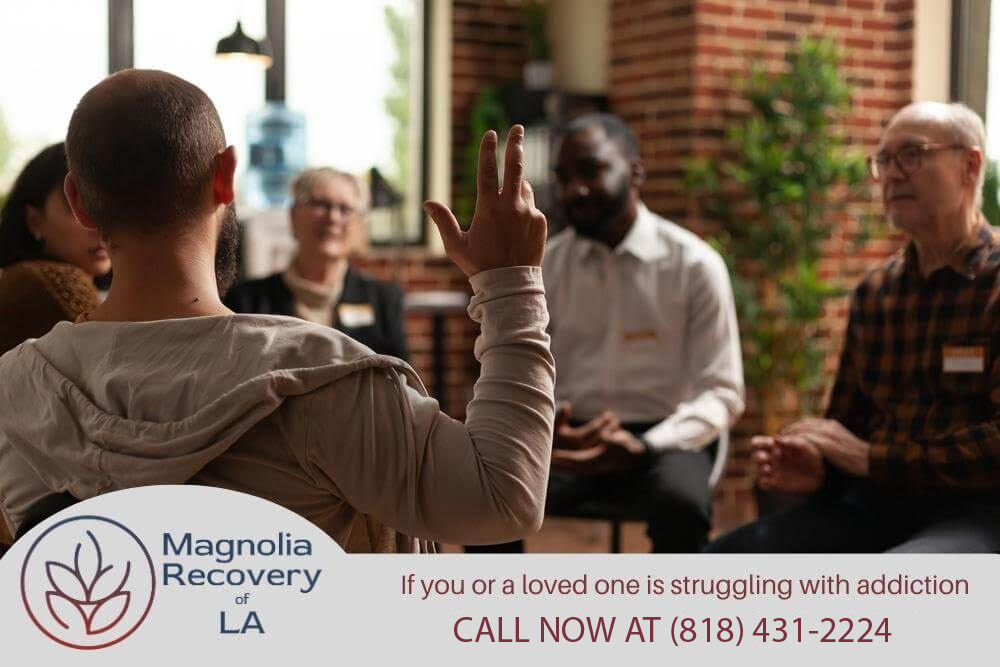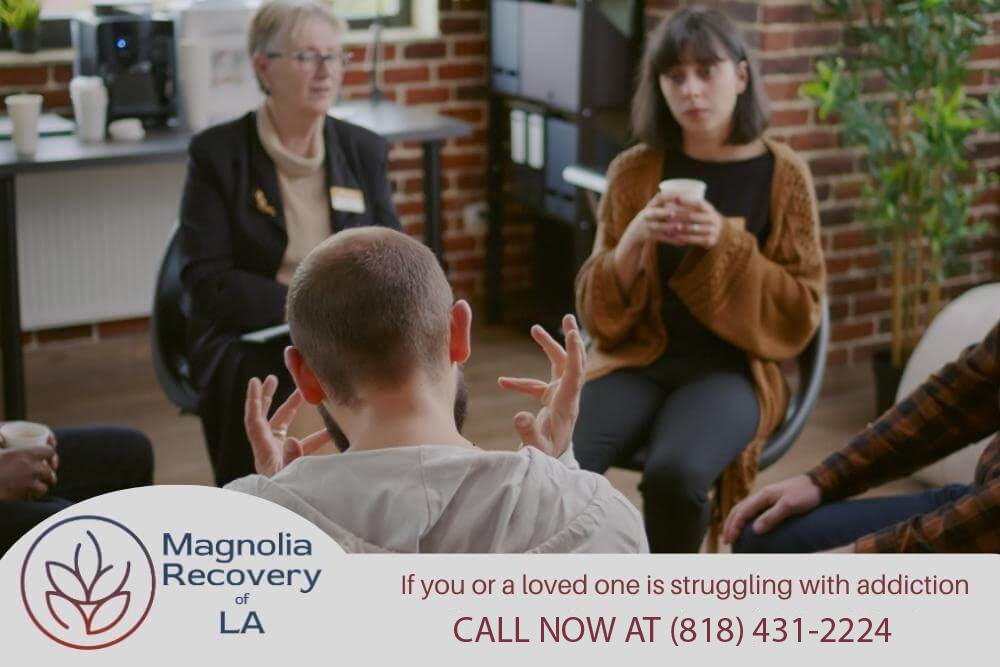Top Rated Outpatient Alcohol Rehab Center in Los Angeles
Alcohol Use disorder is a serious condition that can develop in anybody. Addiction does not discriminate between age, gender, or socioeconomic class, and because alcohol is a legal substance that is culturally acceptable to use, and is found everywhere from supermarkets to restaurants, it can almost feel like you are the odd one out if you don’t drink in some situations.
At first, drinking feels good, producing warm feelings that help you loosen up or relax, and reducing your inhibitions. This is because it affects the way neurotransmitters work in the brain, making changes to the reward centers that release feel-good endorphins and dopamine. Regular drinking or binge drinking continually activates the parts of the brain that are responsible for pleasure, reward processing, feelings of satisfaction, cognitive processing, decision making, and many other crucial processes. Over time, the brain begins to depend on having alcohol in your system for these processes to work normally, leading to habit formation which becomes addiction.
Alcohol addiction occurs when you begin to feel the need to drink compulsively just to feel normal, and avoid withdrawal symptoms. Drinking begins to interfere with your life and your well-being in negative ways, and you start to experience cravings for alcohol. Some of the other common signs of an alcohol use disorder are:
- Isolating yourself from friends and family to hide your alcohol use, feeling guilty about your drinking, and drinking alone
- Being unable to get through the day without a drink, even drinking first thing in the morning
- Having serious trouble at work, school, with your health, and with relationships due to alcohol use
- Calling in sick to work or missing class because you are drunk or hungover
- Taking risks to your own safety or the safety of others while drunk, including drinking at work, breaking the law, or getting into fights
- Planting stashes of alcohol around the home/workplace/on your person, feeling anxious if you don’t have access to alcohol
- Not being able to stop drinking even when you try your hardest, and being unable to control how much you drink in one sitting
- Developing an alcohol tolerance, so you have to drink more to notice the effects
At Magnolia, we offer alcohol addiction treatment in the form of inpatient medical detox, and inpatient residential rehab. Patients can come to us for professional intervention that provides relapse prevention strategies, medical care, therapy, holistic health treatments, and plenty of group support, provided in an inclusive and welcoming treatment center that offers:
- Individualized care for each patient
- Medication-assisted treatment plans
- Medical detox with 24-hour clinical care
- Accessible facilities
- LGBTQ+ inclusive programs
- Family-focused treatments
- Dual diagnosis programs
- Holistic healing options
- Individual and group therapy
- Behavioral therapy
- Aftercare and planning services
Once you complete your time inside the Magnolia treatment center, your outpatient rehab journey can begin. Many people can benefit from ongoing therapy and other addiction treatments and support groups after inpatient care. Outpatient rehab can make the transition back to your normal life a lot easier, because you will have the support and reinforcement you need as you begin to run into triggers and stressful situations in the real world. Magnolia can connect you to outpatient rehab programs that are right for your unique needs, along with other outpatient resources like 12-step groups (Alcoholics Anonymous, etc.), SMART recovery groups, and sober living homes.
Alcohol Rehab That Allows You To Still Go To Work & School
Because alcohol addiction can happen to anybody at any point in their life, people have a variety of needs that have to be taken into account when choosing a rehab program. For some, spending 30 to 90 days away from home in a rehab center is the best option, but for others, going away from their responsibilities like a career or small children can be impossible. For this reason, a variety of outpatient rehab programs are available, that can offer part-time rehab, either during the day or in the evenings and on weekends, with better flexibility so you can continue taking care of family, going to work or school, and meeting all your commitments while attending regular rehab programming, groups, doctor’s appointments, and therapy.
Outpatient alcohol can be a good alternative to inpatient treatment, and it is also a good choice for people leaving inpatient rehab, who are ready to go back to work or return home, but still require therapy and ongoing care to help with the move-out of 24-7 support and back to their life as a sober individual. There are different outpatient levels of care to choose from, so whether you have a mild alcohol addiction that requires a few hours a week of rehab or a severe addiction that is being treated with medications and daily intensive programming, there is an outpatient program that will suit your needs.
It is important to note that for alcohol addiction, it is almost always recommended that patients undergo inpatient detox before beginning any rehab program, as the withdrawal symptoms from alcohol can be severe and dangerous, so even if you do not wish to attend inpatient rehab, you may still need to be away from home for a few weeks to get your symptoms under control and ensure you are not in danger as your body purges the toxins from your system.
Benefits of Outpatient Alcohol Rehab
Participating in an outpatient alcohol rehab program will provide you with many of the same benefits that inpatient treatment provides, but you can live at home (or in a sober living home) as you get treatment. After inpatient detox and/or rehab at Magnolia, you may wish to move into an outpatient program that offers benefits like:
- An adaptable, flexible treatment schedule that can be built around your unique needs, allowing you to continue going to work, meeting important commitments, completing school work, and/or taking care of your family
- Opportunities to apply your new coping tools, stress reduction skills, and other recovery skills to real-life scenarios in real-time, with strong ongoing support from your regular therapy and counselor visits
- Building a sober community around yourself that will be there long-term. Attending group therapy, 12-step meetings, and other alumni and sober support groups can connect you with others nearby who understand what you are going through
- Less stress and worry about your family, pets, home, career, and other important aspects of your life, because you will be there with them
- More discretion, as you will not necessarily need to disclose your personal health information to anybody, take time off work, or make arrangements for your kids while you are away
- A lower cost for treatment, as you will not be paying for accommodation and food
When you go to outpatient rehab after leaving Magnolia’s inpatient treatment center, you will also have connections with alumni who will offer support and fellowship when you need it most. The alumni community from Magnolia is caring and nonjudgmental, and they get where you are coming from, so you will always have someone to talk to.
What To Expect During Outpatient Rehab
Each outpatient rehab facility is unique in the types of treatments they offer, as well as the scheduling, so you may wish to look at a few options before deciding which outpatient rehab center is right for you. For many patients, you will first undergo a safe medical detox treatment plan in inpatient care. At Magnolia, our detox plans include round-the-clock medical care and oversight from licensed and experienced nurses, with a doctor on call 24 hours a day. Medications will be provided to help you through withdrawal symptoms like anxiety, nausea, shaking, and pain, and you will also receive treatments that will prevent seizures and delirium tremens from occurring. Detox is different for each patient, depending on their own unique biology, as well as how much they’ve been drinking and for how long. Once you have completed your detox and are considered medically stable, you can begin your rehab with a clear head and a better ability to focus.
Most outpatient treatment programs will have care that includes behavioral health treatments like cognitive behavioral therapy, dialectical behavioral therapy, or rational emotive behavioral therapy. There will likely be one-on-one talk therapy or counseling, as well as plenty of group therapy and support groups to partake in. You may also receive education about addiction, life skills training, or work on a nutrition and exercise program.
Relapse prevention is a big part of any outpatient treatment plan, giving you skills that will help you avoid drinking for the rest of your life, including stress management, distress tolerance, identifying triggers, and learning new ways to think and act that are healthier and more productive.
Family therapy will help you to work through issues with family members that may have been caused by your drinking, healing old emotional wounds, and improving communication between loved ones. This is often an important feature of addiction treatment, because, for many people, family support can make all the difference in their recovery. Family members can also learn about codependent relationships and enablement, which will improve their ability to help you along the way.
Support group meetings in the community, including SMART recovery and 12-step meetings like Alcoholics Anonymous, are also helpful additions to many people’s outpatient rehab programming because they not only introduce further peer support but also incorporate an element of spirituality, as well as providing structure in the form of the 12 concrete steps you can take to work toward long-term sobriety.
How Long Does Outpatient Rehab Last with Magnolia Recovery?
Each person’s timeline is different when it comes to outpatient rehab. After completing alcohol detox, which can take up to two weeks, and inpatient treatment, which can be 30 days to 90 days, depending on your emotional, physical health and mental health needs, you then have different options for outpatient treatment to choose from. A partial hospitalization program (PHP) is usually a few weeks long, with intense, full-day treatments every day, whereas an intensive outpatient program (IOP) can last for 30 or more days. There are also long-term aftercare programs that involve elements of outpatient rehab once you have completed these programs, and these can last for months or even years if you wish to continue receiving therapeutic support and guidance.
IOP (Intensive Outpatient Program)
An intensive outpatient program is a popular choice for outpatient alcohol addiction treatment because it allows patients to continue living their regular life while getting the care that they need to overcome alcoholism. Patients are usually invited to the treatment center for therapy, groups, and other treatments 3 to 5 times a week, usually for 3-hour sessions. These occur at convenient times that let you go after work, or while the kids are in school, allowing you to maintain your current lifestyle as you heal and gain the tools you need to stay sober.
PHP (Partial Hospitalization Program)
Partial hospitalization programs are very similar to inpatient rehab but allow patients to return home in the evening. You would treat a PHP like your full-time job, commuting there in the morning, and staying for full days, usually 5-6 hours a day, for 5-7 days a week. This gives plenty of time for therapy and groups, as well as mental health care, social activities, holistic treatments, and other whole-patient healing options that will help you build a community and understand more about sober living.
Which Outpatient Treatment, IOP or PHP Is Right for Me?
Your unique needs and recovery goals will determine which level of care is right for you. It may be difficult for you to determine for yourself which type of treatment is best, but the outpatient rehab center will work with you, through intake screenings and an in-depth interview, to figure out the course of treatment that will be most helpful to your situation.
Why Choose Magnolia Recovery
Magnolia is an inpatient treatment center specializing in detox and residential care, providing a calm and peaceful environment, where anybody can come to begin their recovery. We will create a customized care program that will meet you where you are in your recovery, offering affordable treatments provided by helpful, caring, and non-judgmental doctors, nurses, therapists, psychiatrists, addiction specialists, and more.
In our licensed rehab center, you will access treatments that are rooted in evidence-based science, and we also offer holistic healing approaches like meditation, yoga, and art therapy to help you heal the body, mind, and spirit together in one 30 to a 90-day inpatient rehab program.
If you are considering alcohol treatment and are wondering what steps to take, please give us a call today at (818) 431-2224. We can answer your questions and provide information to help guide your decision, including verifying insurance coverage. Our professionals are available 24 hours a day to help you get started.


